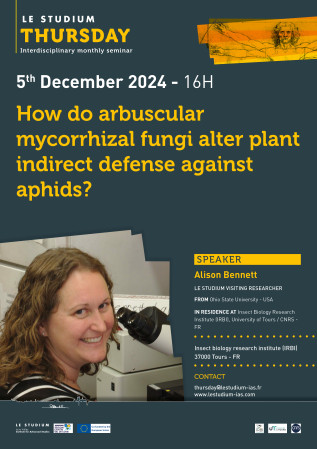How do arbuscular mycorrhizal fungi alter plant indirect defense against aphids?
IRBI - Salle séminaire Faculté des Sciences et Techniques
Avenue Monge, Parc Grandmont
37000 Tours
France
Presentation
Arbuscular mycorrhizal (AM) fungi partner with plants and act as a second set of roots allowing plants to access nutrients from a wider area. In addition, while establishing their partnership with plants AM fungi also prime plants for faster immune responses when they are challenged by pathogens and insect herbivores which eat plants. The majority of work suggests that priming influences immune responses to herbivores that chew plants (e.g., caterpillars) but not herbivores that “suck” from phloem (the veins of plants) such as aphids. Our early work provided evidence that AM fungi may alter indirect defense (or the release of volatile organic compounds that attract parasitoids (enemies)) against aphids, and here at the Institut de Recherche sur la Biologie de l'Insecte (IRBI) we are combining resources to provide further evidence that AM fungi alter volatile organic compounds. Beginning today (5 December) we have added aphids to tomato plants hosting AM fungi and taken measurements of VOCs. We will continue to monitor VOC release over 12 days and assess whether parasitoids are more attracted to plants hosting AM fungi and aphids using wind tunnel assays. We expect this work to expand our understanding of the role of AM fungi and other soil organisms in the management of plant-insect interactions.
Speaker
LE STUDIUM Visiting Researcher
FROM: Ohio State University - US
IN RESIDENCE AT: Insect Biology Research Institute (IRBI), University of Tours / CNRS - FR





